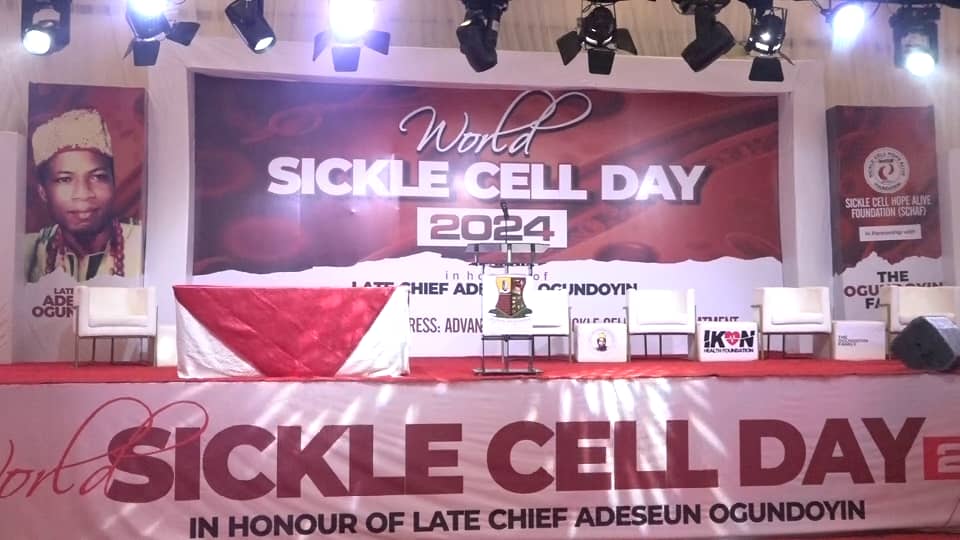
Children of the late accomplished businessman and son of Eruwa land, Chief Adeseun Ogundoyin, have donated ₦5,000,000 to the Sickle Cell Hope Alive Foundation, SCHAF, to intensify the fight against Sickle Cell Disease in Oyo State and Nigeria at large, in honour of their late father, who was a carrier of sickle cell disease but died on June 18, 1991 at the age of 51.
The Ogundoyin family led by Speaker of the Oyo State House of Assembly, Rt. Hon. Adebo Ogundoyin made the donation on the occasion of the World Sickle Cell Awareness Day 2024 organised by SCHAF in partnership with the Ogundoyin family.
The family also presented medical packs that will last in the treatment of each sickle cell patient, who are also called warriors, for three months to over 500 patients across age brackets at the event held at Theophilus Ogunlesi hall, Ibadan.
Describing the late Chief Ogundoyin as a dogged fighter, the Deputy Governor of Oyo State, Barr. Bayo Lawal, said no condition should define a human being.

He acknowledged the numerous accomplishments of the late Chief Ogundoyin and his political influence across the nation.
Speaking on behalf of the family, the son of the late Adeseun Ogundoyin and Speaker of the Oyo State House of Assembly, Rt. Hon. Adebo Ogundoyin, appreciated the Sickle Cell Hope Alive Foundation for their many years of dedication to giving hope to people living with sickle cell disease.
The Rt. Hon. Speaker who is also the Chairman of the Conference of Speakers of Nigeria, said the Ogundoyin family will continue to join those at the forefront of the fight by providing drugs and empowering those affected by the deadly disease to honor the memory of a life well-lived by by their father, his legacy that continues to inspire humanity and to celebrate the resilience of those living with the disease.
To honour their late father, the Ogundoyin family saddled the Commissioner for Information, Prince Dotun Oyelade with the task of writing a new book titled: “Passion beyond borders: The untold story of Adeseun Ogundoyin.”
Prince Oyelade, who had in June 1992 authored a book on the late Chief Ogundoyin, titled “Adeseun Ogundoyin: His Life and Times” to mark the first Anniversary of his death, said the late patriarch did not allow his health condition to limit his dream neither did it discourage him from reaching out to the needy or inhibit him from living a very proactive life.
Oyelade said it is by sheer grace of God that 32 years after writing the first book he is being asked to perform the same function in a wider dimension.
Prominent members of the Oyo State House of Assembly who honoured their Speaker at event, said the late Chief Ogundoyin led a legacy of hope which has resonated in the accomplishments of his children.
Stating that Nigeria has the highest number of people with sickle cell disease in her keynote address, the Vice Chancellor, Chrisland University, Prof. Chinedum Babalola, said early detection, effective treatment and possible cure has become the focus on sickle cell disease across global platforms.
Citing the laudable achievements of late Chief Adeseun Ogundoyin despite his health status, Prof. Babalola who cautioned against stigmatisation of the patients, challenged all people with sickle cell disease to continue to aspire for greatness and conquer the world.
Disclosing that the last 50 years of her life has been dedicated to awareness on Sickle Cell, the founder, Sickle Cell Hope Alive Foundation, Prof. Adeyinka Falusi, said the generosity of the Ogundoyin family has rejuvenated her drive for the worthy cause.
Acknowledging the contribution of the late Chief Adeseun Ogundoyin to the fight against Sickle Cell disease in their addresses at the event, the Project Lead, Ikon Health Foundation, Dr. Chioma Ihekoronye and a member, board of Trustee of Sickle Cell Hope Alive Foundation, SCHAF, Engr. Ibukun Falusi, appreciated all stakeholders who are instrumental to reducing the burden of sickle cell disease in Nigeria.
They called for increased funding for research and more robust support for those living with sickle cell disease.
